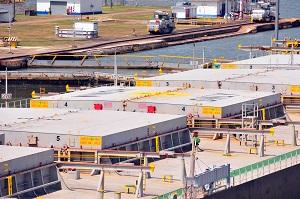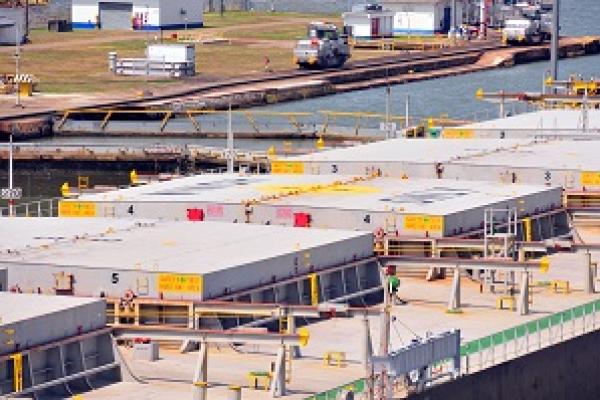
Steamship Mutual
Published: January 02, 2019

In Clearlake Shipping Pte Ltd v Privocean Shipping Ltd the English High Court held that, since US COGSA applied to the charterparty, the Owners were entitled to rely on the exception “negligence in the management of the ship” for the Master’s negligent decision to require additional cargo strapping in one of the cargo holds of the ship.
The facts
A dispute arose between Owners and Charterers with respect to the stowage of a consignment of soya beans to be carried from New Orleans to China. The Master refused to accept any stowage plan other than one where holds number 2 and 6 were partially loaded and which required the strapping of the cargo in hold number 2. Charterers incurred additional costs in the region of US$410,000 as a result of the strapping required by the Master.
The Charterparty
The relevant clauses of the governing Time Charterparty (NYPE 1946 Form) were:
- Clause 2 imposed on Charterers the burden of providing “necessary dunnage and shifting boards, also any extra fittings requisite for a special trade or unusual cargo”.
- Charterers were, as per clause 8, responsible for loading and stowing the cargo.
- The Charterparty incorporated the United States Carriage of Goods by Sea Act 1936 ("US COGSA").
The Arbitration
Owners commenced arbitration proceedings in London for about US$400,000 of unpaid hire and Charterers counterclaimed for about US$410,000 of additional costs incurred in strapping the cargo.
The arbitrators found, based on the expert evidence, that the strapping costs were unnecessarily incurred as adequate stability could have been achieved without strapping the cargo. Further, the plan could have been derived from the software the Master had available to him.
While the arbitrators found the Master to have been negligent, they held that Owners’ liability was excluded by section 4(2) of US COGSA as the neglect or default of the master was "in the management of the ship", rather than in the management of the cargo.
The High Court decision
Charterers appealed the decision and Cockerill J upheld the award of the arbitrators on the following grounds:
- Whilst clause 2 provided that Charterers were required to provide fittings for special trades or unusual cargoes, such a clause could not be interpreted so as to impose on Owners the duty to pay for unnecessary fittings.
- Pursuant to clause 8 responsibility for loading was transferred to the Charterers. The Master’s role in creating a stowage plan was supervisory and not primarily related to care for cargo but pertaining to the stability of the vessel.
- The Owners were entitled to rely on the US COGSA exclusion of liability for “Act, neglect or default of the master… in the management of the ship” because, although the Master’s negligence concerned the stowage/securing of cargo, his negligence was ultimately aimed at ensuring the ship's safety and stability, which fell under the scope of “the management of the ship”.
Conclusions
The present case is an important reminder of the controversy as to what constitutes negligence in the management of the vessel and/or the cargo.
The leading case is Gosse Millerd, decided by the House of Lords in 19281. A cargo of tinplate had been loaded into one of the holds of the “Canadian Highlander”. The ship suffered a casualty at the next port, and repairmen had to enter the hold through hatch accesses to carry out repairs. The tinplate was later found to be damaged by rainwater, which had entered the hold at this time. Owners sought to rely on the defence of errors in the management of the ship, but the Law Lords held that the failure to rig hatch tents or tarpaulins or a similar arrangement to protect the cargo at this time was a breach of the carrier’s obligation to care for the cargo.
In the leading judgement, Lord Hailsham drew a distinction between “want of care of the cargo” which might be a breach of the carrier’s obligations, and “want of care of the vessel indirectly affecting the cargo” which might allow the carrier to rely on the exception.
In subsequent cases, in The Iron Gippsland2, the Australian courts held that a cargo contamination arising out of the failure to maintain the vessel’s inert gas system, was not due to a failure in management of the ship but due to a negligent act in the management of the cargo. Even though the inert gas system of the ship was in place for the safety of the vessel the system was primarily used as part of the management and protection of the cargo. Whilst in The Eternity3 the English Courts looked at a similar issue with separation valves and reached broadly the same conclusion based on an analysis of the use to which the relevant valves were being put at the time.
In Clearlake Shipping Pte Ltd v Privocean Shipping Ltd, Cockerill J., considered that “what drove the master to act as he did was a consideration of the stability of the vessel and was, hence, a care of the ship issue.” and decided that “it seems to me that it is relatively clear that the primary nature and object of the acts which caused the loss were ones which related to ship management in the sense of stability, and that what was in question was not a want of care of cargo, but a want of care of the vessel which had an effect on the cargo.”
In Clearlake Shipping Pte Ltd v Privocean Shipping Ltd, we were reminded that Owners could be entitled to rely on the Hague/Hague Visby Rules or US COGSA exception of negligence in the management of the ship for the acts of the shipowners’ servants that involved cargo, provided that the primary interest the Master was protecting was the ship.
1Gosse Millerd v Canadian Government Merchant Marine (The Canadian Highlander) [1928] 32 Lloyd’s Rep 91
2Caltex Refining Co Pty Ltd v BHP Transport Ltd (The Iron Gippsland) [1994] 1 Lloyd’s Rep. 335
3The Petroleum Oil and Gas Corporation of South Africa (Pty) Ltd v Fr8 Singapore Pte Ltd (The "Eternity") [2008] EWHC 2480 (Comm)
Article by Miguel Caballero


